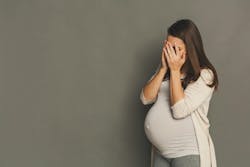A snippet of hair can reveal a pregnant person’s stress level and may one day help warn of unexpected birth problems, a study indicates.
Washington State University researchers measured the stress hormone cortisol in hair samples of 53 women in their third trimester. Of that group, 13 women who had elevated cortisol levels later experienced unpredicted birth complications, such as an early birth or hemorrhaging.
While more research is needed with larger groups, this preliminary finding could eventually lead to a non-invasive way to identify those at risk for such complications. The researchers reported their findings in the journal Psychoneuroendocrinology.
As part of the study, the participants all answered survey questions about their levels of psychological distress in addition to having cortisol measurements taken in the third trimester of pregnancy and after they gave birth. The women who experienced unexpected birth complications had elevated cortisol concentrations in their hair, a measure that indicates the stress hormone’s circulating levels in the body during the three months prior to collection. These women also reported feelings of stress, anxiety and depression, but on average, only high cortisol levels during pregnancy showed a strong link to adverse birth outcomes.
Throughout pregnancy, cortisol levels naturally rise two to four times and peak during the third trimester, but the measurements in this study showed even more pronounced elevated cortisol levels among the women who had unexpected birth complications.
Two months after giving birth, the group that experienced birth complications continued to show elevated cortisol and gave survey answers indicating continued stress, anxiety and depression. At six months, their cortisol remained elevated, but they started to report lower psychological distress on the survey, which the authors noted might be a sign of recovery.

